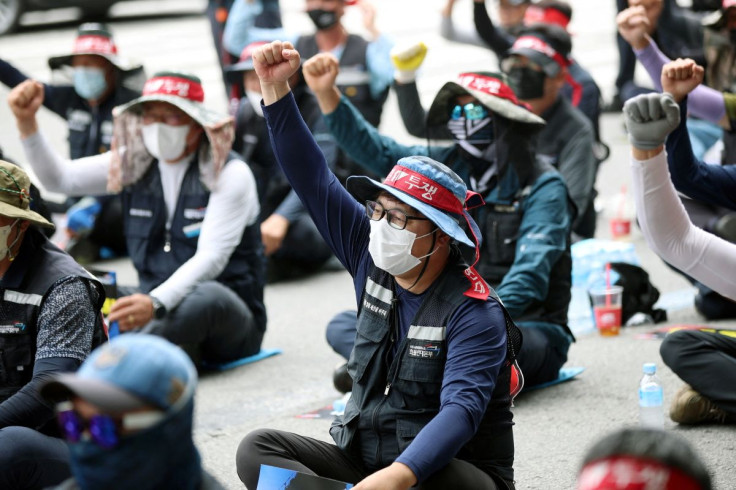South Korea Inc Under Mounting Stress As Truckers Strike For A Seventh Day

A strike by South Korean truckers has cost key industrial sectors more than $1.2 billion in lost production and unfulfilled deliveries, the government estimated on Monday, as the damage spreads deeper throughout the economy.
The strike, now in its seventh day, has forced steelmaker POSCO to halt some plants due to a lack of space to store unshipped products. Hyundai Motor has cut production for some assembly lines and cement makers have also reduced output.
Petrochemical firms were also in pain with average daily shipments from factories having tumbled 90% due to the strike as truckers target major petrochemical complexes in Ulsan, Yeosu and Daesan, an industry association said.
It was not immediately clear if petrochem firms were also cutting production.
The Cargo Truckers Solidarity union is protesting soaring fuel prices and demanding minimum pay guarantees. Four rounds of negotiations with the government have failed to find a compromise.
The 6,600 members or about 30% of the union were striking on Monday, according to a transport ministry estimate.
In its first such calculation, the industry ministry said in a statement that the strife has cost automobile, steel, petrochemical and cement sectors about 1.6 trillion won ($1.2 billion) in lost production and failed deliveries between June 7-12.
There have been as yet no reports of major production disruptions at Samsung Electronics, SK Hynix and other semiconductor firms.
Kim Yang-pang, a researcher at Korea Institute for Industrial Economics & Trade, estimated Samsung Electronics and SK Hynix and their suppliers had at least two weeks worth of raw materials stocked.
"It's unclear how long the strike will go on but the impact will be limited."
Sources at semiconductor companies also told Reuters the firms were not expecting to see an imminent impact on chip production as they have inventories of key materials.
Samsung declined to comment. Hynix did not immediately respond to a request for comment.
The prolonged labour strife is a major test for President Yoon Suk-yeol, who took office five weeks ago, potentially distracting from his conservative agenda and raising the risk of long-term antagonism with powerful unions.
The government has urged the truckers to return to work but said it would seek to reflect their demands in the legislative process and keep trying to end the strife through dialogue. It has also deployed some 100 military vehicles to help companies with shipments.
The truckers are demanding an extension of subsidies, set to expire this year, that guarantee minimum wages as fuel prices rise. The Yoon administration says it is up to parliament to change the legislation.
As the global economy struggles with supply bottlenecks, any prolonged slowdown in the production and shipments of chips, petrochemicals and autos could add to concerns about rising inflation and slowing growth.
South Korea's inflation is set to hit a 24-year high of 4.8% this year, the Organisation for Economic Cooperation and Development said last week, while cutting its growth forecast to 2.7% from a December projection of 3.0%.
($1 = 1,285.9800 won)
© Copyright Thomson Reuters 2024. All rights reserved.







